Research thematic areas
Captive broodstock development, domestication, and seed production of commercially important native Penaeid shrimps: Indian White Shrimp (Penaeus indicus), Kuruma Shrimp (Penaeus japonicus).

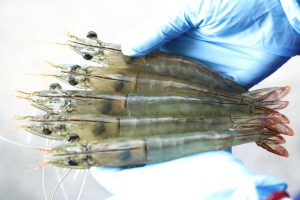
Penaeus japonicus Penaeus indicus
Copefloc-based farming of Penaeus vannamei shrimp
Copefloc based nursery rearing of P.vannamei shrimp in lined pond system yielded a better growth of 0.6-1.2 g in 30 DOC with a stocking density of 2500 nos/m3 compared with 0.4-0.6 g in the conventional nursery system. Further, the copefloc nursery reared juveniles stocked @ 40 nos. /m2 in the grow-out attained a growth of 15.2g in 50 days of culture with a better feed conversion ratio of 1.07 and a productivity of 4400 kg/ha. Better compensatory growth gain, reduced chance of disease outbreak due to short culture duration and reduction in crop duration of up to 30 days compared to conventional farming are the major advantages of copefloc based shrimp production systems. This system can help the farmers to take more crop per cycle and better economic return.
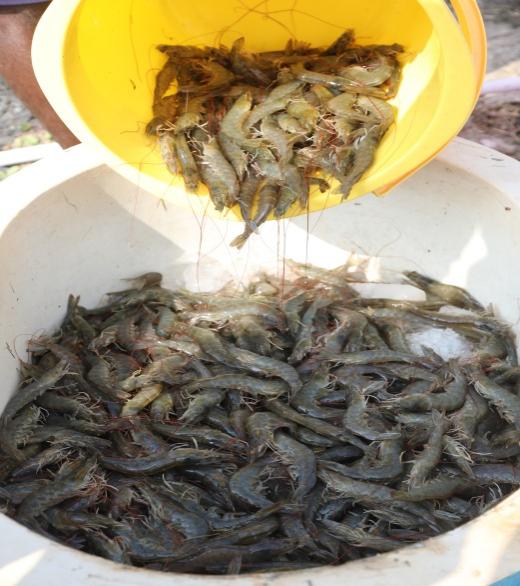

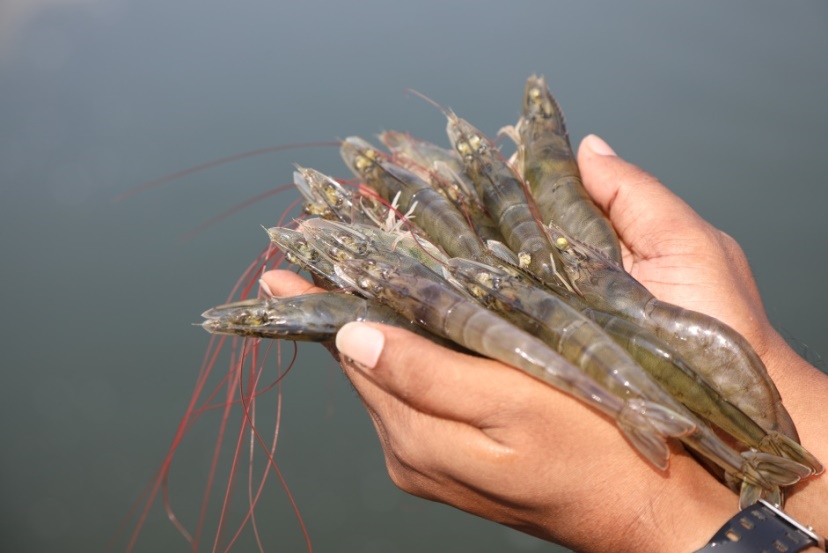
P. vananmei produced from copefloc technology
Seed production and culture potential of lesser penaeid flower tail shrimp (Metapenaeus monoceros)
Seed production and larval rearing technology of flower tail shrimp (Metapenaeus monoceros) shrimp are standardized. The larval rearing cycle was completed within 9-10 days, and larvae are fully fed with a microalgae-based diet. It is a native lesser penaeid shrimp. Although the growth rate of the species was not on par with other fast-growing candidate species, the shrimp being hardy and easy to breed, it can be explored for location-specific farming in traditional farming areas due to its high demand in the domestic market.

Metapenaeus monoceros broodstock
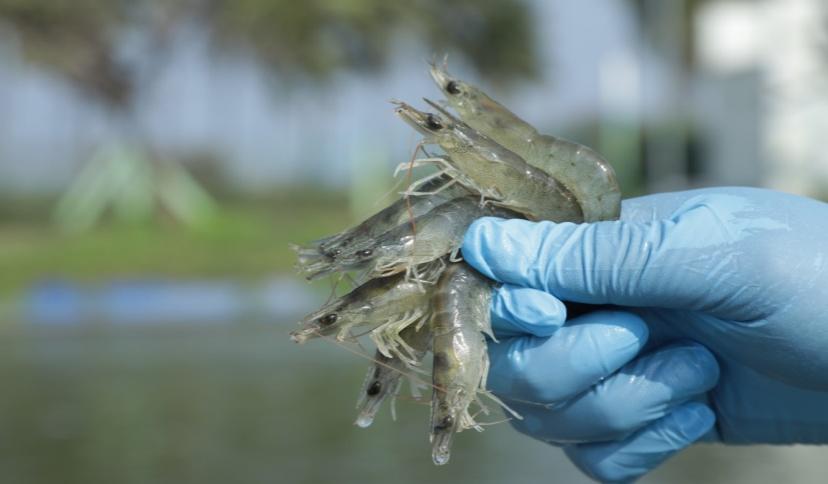
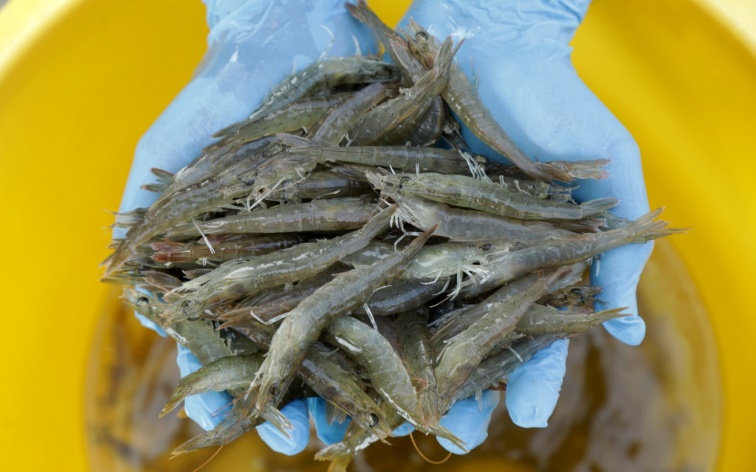
Hatchery and farm produced Metapenaeus monoceros
Penaeus japonicus
Development of sustainable farming technologies for increasing the production efficiency of farmed crustaceans (Shrimps and Mudcrab).
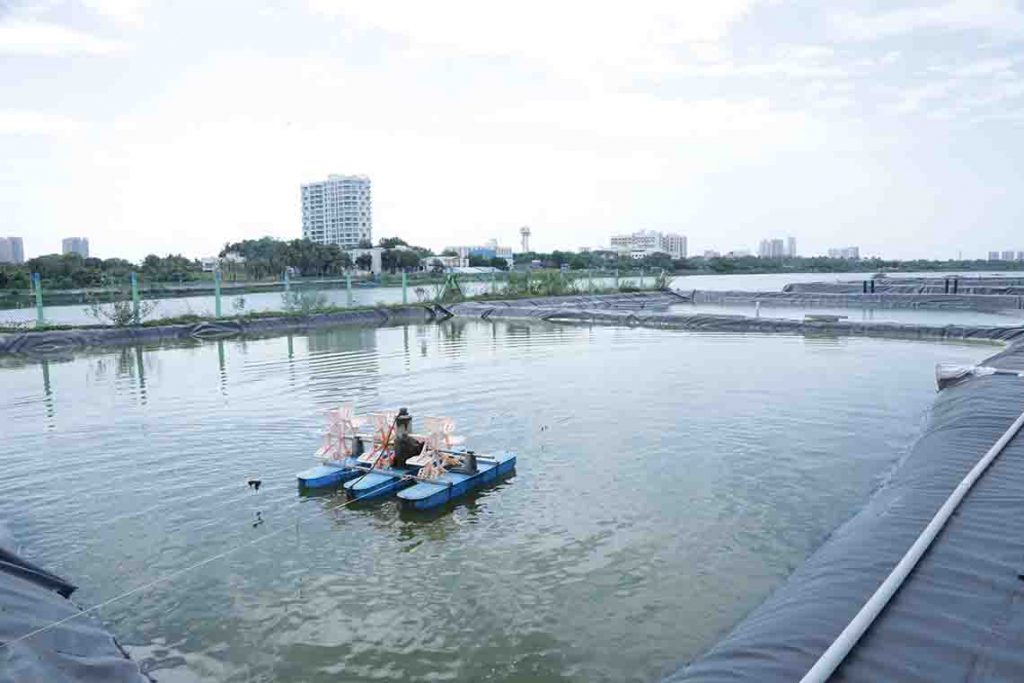
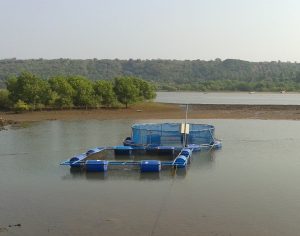

Scientific shrimp farm IMTA model farm Mud crab polyculture farm
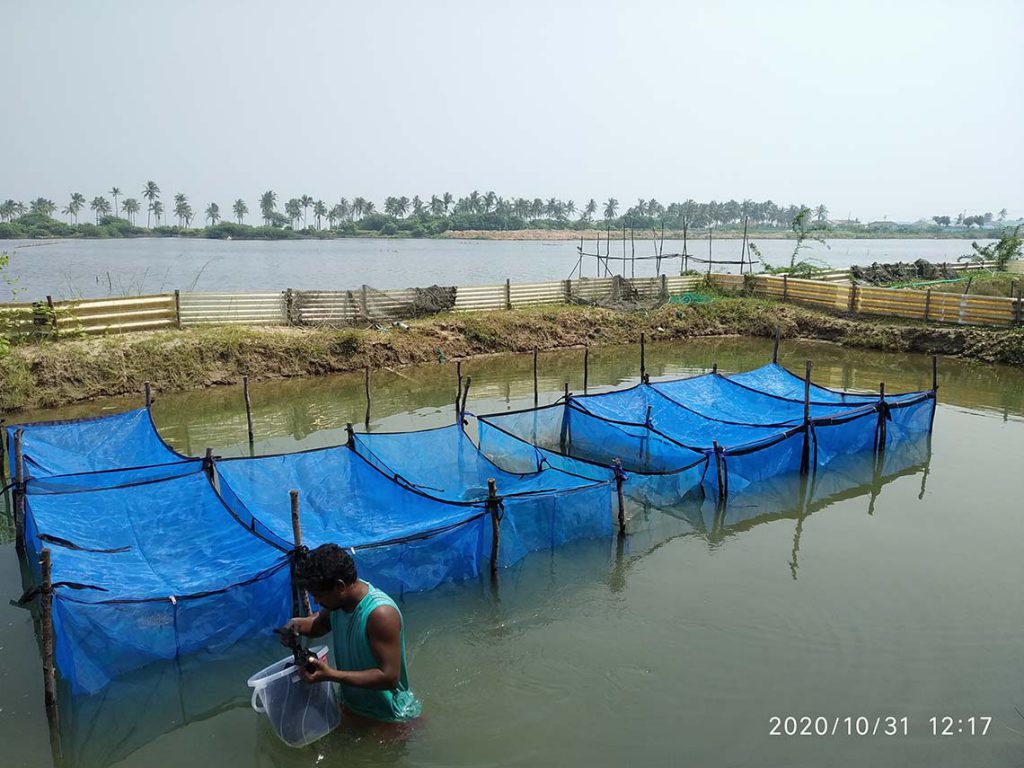
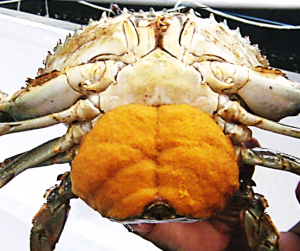
Mudcrab nursery rearing farm
Diversification of production systems in tune with species abundance, hydro and agro-climatic conditions for sustainable brackishwater aquaculture

Modular Biofloc nursery rearing unit
Modular biofloc nursery rearing unit for shrimp/fish is developed at Kovalam experimental station (KES) of ICAR-CIBA.

Biofloc nursery
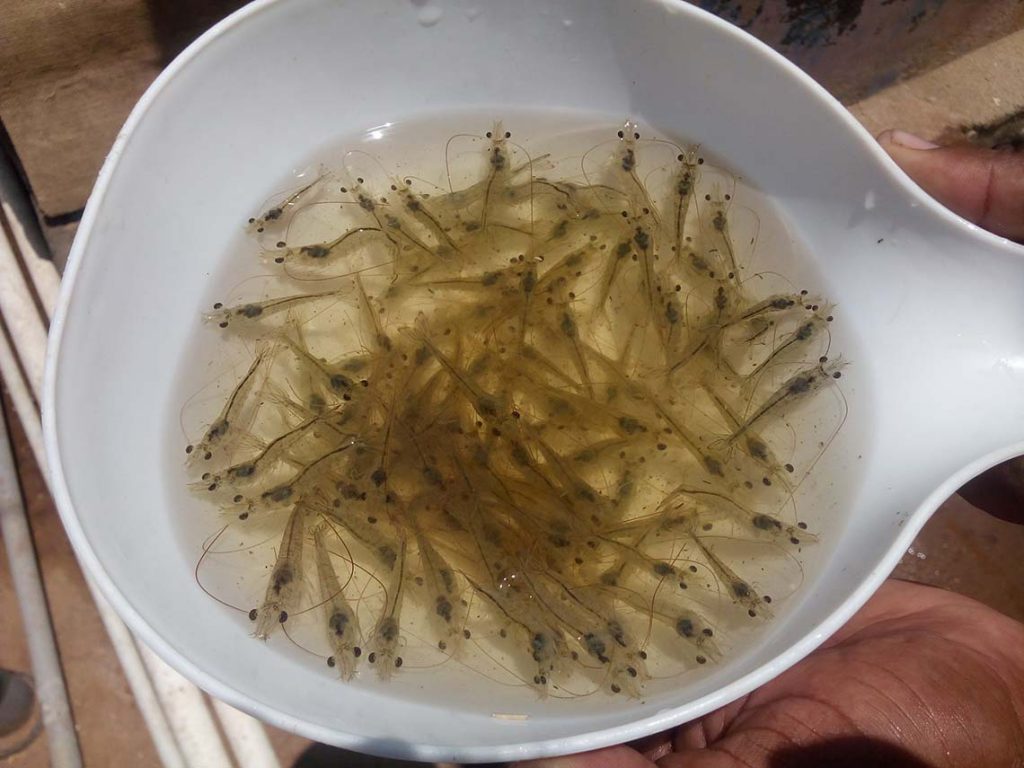
Biofloc nursery reared shrimp

Organic Shrimp pond
Development culture technology for functional live feeds such as polychaete (Perinereis sp., Nemalycastis sp., and Marphysa sp), Artemia, and Copepods (cyclopoid copepod Dioithona sp. and cladoceran copepod Eurycercus berinji).

Harvested polychaete
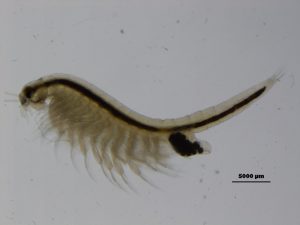
Adult Artemia

Live feed copepod
Aquaculture planning using geospatial technology, watershed approach, design and development of non-conventional energy appliances for farm/hatchery mechanization, and climate change impact assessment vis-à-vis brackishwater aquaculture resources.

Solar feeder
Development of technology package for seaweed farming in brackishwaters.
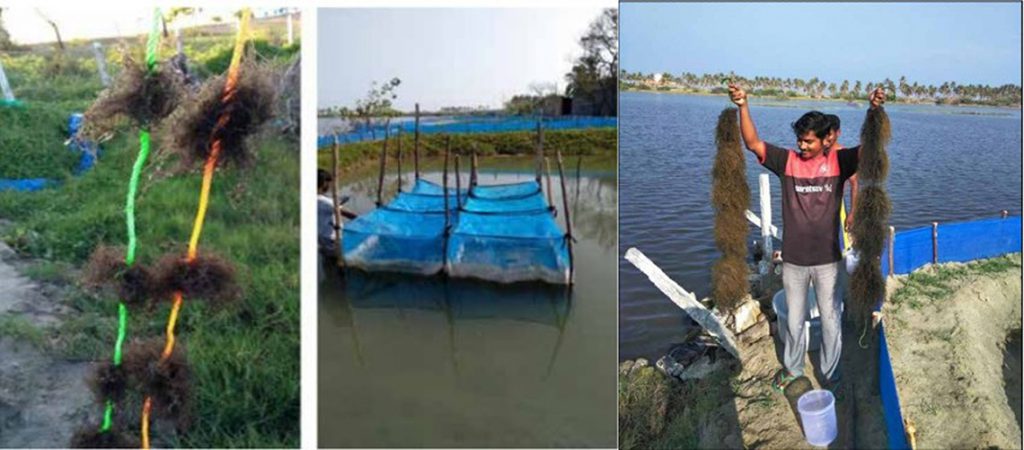
Seaweed farming
- Doctoral research programmes and capacity enhancement of stakeholders.
- Technology commercialization and Provision of consultancy services.
Research projects – in operation
| No | Title | Funded By | Period |
|---|---|---|---|
| 1 | Technology upgradation and optimization of protocols for diversified systems and species of crustaceans through sustainable approaches (PI: Dr. A. Panigrahi) | ICAR-CIBA | 2022-2026 |
| 2 | Captive maturation, breeding biology and larviculture of candidate crustacean species for brackishwater aquaculture (PI: Dr. C.P. Balasubramanian) | ICAR-CIBA | 2022-2024 |
| 3 | Resource Mapping of Brackishwater Aquaculture in Tamil Nadu (PI: Dr. (Smt.) M. Jayanthi) | Dept. of Fisheries, Tamil Nadu | 2022-2023 |
| 4 | Development of grow-out technology for mass culture of sand and muddy polychaete worms and assessment of their seasonal nutritional profiling for use in shell and finfish hatcheries (PI: Dr. S. Kannappan) | DBT | 2022-2023 |
| 5 | Development of indigenous shrimp (Indian white shrimp) aquaculture: Genetic improvement Program of Penaeus indicus, Phase - I (PI: Dr. A. Panigrahi) | PMMSY | 2022-2024 |
| 6 | Mapping of salt affected lands of Rajasthan with potential for saline aquaculture (PI: Dr. (Smt.) M. Jayanthi) | Govt. of Rajasthan | 2022-2024 |
| 7 | Development of sustainable and cost-effective brackish-water farming technologies for shellfish and finfish in the north-west coast (PI: Shri Jose Antony) | ICAR-CIBA | 2022 |
Research projects – completed recently
| No | Title | Funded By | Period |
|---|---|---|---|
| 1 | Evaluation and refinement of indigenous automatic feed dispenser for shrimp farming (National Fisheries Development Board). | NFDB, Govt. of India | 2016-2019 |
| 2 | Seaweeds for bioremediation in Recirculatory Aquaculture system (Water technology initiative Department of Science and Technology-WTI-DST) | WTI-DST Govt. of India | 2015-2019 |
| 3 | Technology up-gradation and refinement for sustainable development of diversified systems and species of Penaeid shrimp | ICAR-CIBA | 2015-2018 |
| 4 | Issues in biology, reproduction, larval rearing of candidate crustacean species for brackish water aquaculture | ICAR-CIBA | 2015-2018 |
| 5 | Upgradation of Breeding and Culture Technology of Indian White Shrimp Penaeus indicus through stock evaluation and culture Demonstration (Multi- disciplinary Project) | NFDB (Rs.203 lakhs) | 2014-2018 |
| 6 | Healthy shrimp and ‘gift’ tilapia production through bio-floc based farming system: Development of technology and standard operating procedure (Multi-Institutional Project involving ICAR-CIBA and TNJFU, TN) | Department of Biotech. (Govt. of India) (Rs.161 lakhs) | 2016-2019 |
Laboratories/facilities
Multi-species shrimp hatchery, Muttukadu Experimental Station- ICAR-CIBA
- Experimental native shrimp hatchery of India
- Production capacity-10 million / year
- Species produced are
-
- Indian white shrimp (Penaeus indicus)
- Kuruma shrimp (Penaeus japonicus )
- Banana shrimp (Penaeus merguiensis)
- Metapenaeus sp. Like monoceros ,M.dobsonii
- Shellfish biology laboratory